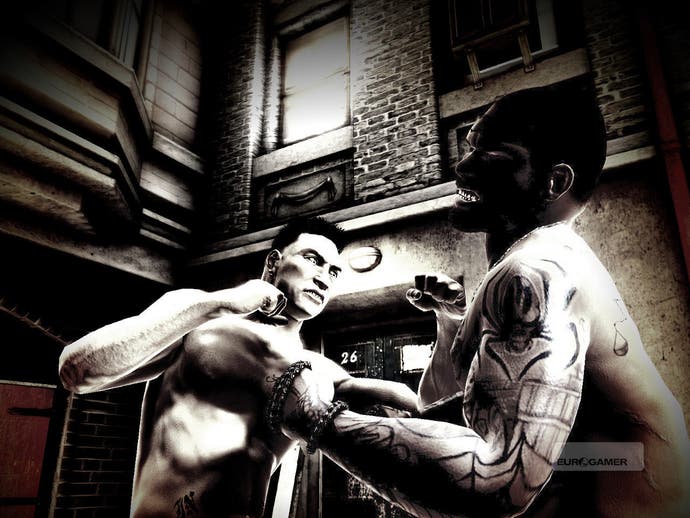The Fight: Lights Out
Knuckle down.
Indeed, the lack of a first-person viewpoint is perhaps the game's most glaring omission. For all your exertion, it never feels like you're actually in the fight, more like a weird omniscient puppet master making some poor meatbag dance awkwardly to your pugilistic tune.
Eventually, however, you do reach a grudging truce with the motion fighting – though it's debatable whether that's due to you finally understanding the intricacies of the system, or just becoming accustomed to its foibles.
Once that happens, you start to unlock more arenas and opponents, working your way through 12 locations, each offering twelve bouts. 144 slugging matches suggests a lot of content, and it's true that the offensive options keep expanding with headlocks and spinning elbow strikes and dirty groin punches, but it's also a long, often tedious road to victory. You'll ache like a smashed crab as well, so this isn't a game to plough through in a few sittings.
There are peripheral features to distract from the one-note face-crunching, but they don't really inspire. You have an in-game cash balance that is inflated by successful fights and well-placed punches, and depleted by paying for training sessions and patching up broken bones. You can also bet this purse on your fights, should you wish to put your money where your broken, bleeding mouth is.

Rudimentary stats are on hand for your fighter, and can be topped up periodically. It makes sense to be able to make your fighter tougher or more resilient over time, but stats relating to speed and accuracy seem annoyingly redundant. You're the one throwing the punches, after all, so why should stats matter?
You can even design your fighter around your own height and weight, at which point the game works out your Body Mass Index and tracks how many calories you burn during each fight and over time. It's a nice touch, but if the idea was to smuggle a fitness package into a game designed for Danny Dyer fans it probably would have been better had the game included something to explain how to improve your technique and exercise more efficiently, rather than just making you slug virtual speed bags for no good reason.
That "halfway there" feeling extends to The Fight as a whole. The presentation feels generic, with washed-out grainy visuals and a tepid hip-hop soundtrack, while the fighting never really finds its balance. It feels pretty great when you land a good punch, but too often you're left wondering why that thundering left hook you just threw failed to connect on the screen. Multiplayer options for both split screen and online play add some longevity, but The Fight mostly feels like a half-baked idea thrown into the ring before its time.
